Why is Barack Obama the only cool, optimistic progressive left?
A counter-culture against depressive affect and trauma bonding as progressive credentials
Dear friends,
I had so much fun watching Hasan Minhaj interview Barack Obama. Beyond my admiration for both, it’s one of the most humanizing interviews I’ve ever seen of any politician.1 It’s well worth the 30 minutes of your time:
Somewhere in the middle of the conversation, Minhaj seems frustrated with Obama’s slow-speaking, charismatic optimism about the long arc of history, etc, etc. He says he’d like to see Obama get upset more often. He draws a distinction between Trump, who he calls “factually inaccurate but emotionally honest” and Obama, who he calls “factually accurate but emotionally dishonest.” The accusation clearly strikes a nerve, and Obama (ironically) looks like he’s about to get upset before he reigns it in to defend both his genuine personality (“pretty nerdy and optimistic by nature”) and a progressive politics based on optimism.2
Today’s progressive politics, as I experience it, is not based on optimism or, dare I say, progress. It’s mostly based on trauma-bonding about the unjust state of the world and catastrophizing about worst-case scenarios for our future. Nothing is less popular amongst progressives today than talking about progress — despite the obvious, objective truth that the state of the world is far better (especially for women and people with darker skin) than at any time in history.3 Taylor Lorenz captured the Millennial progressive aesthetic nicely when she tweeted, “we’re living in a late stage capitalist hellscape during an ongoing deadly pandemic w record wealth inequality, 0 social safety net/job security, as climate change cooks the world.”
All the predictable pundits jumped on Taylor’s tweet as a chance to pull out their favorite graphs and arguments that show without any doubt that life is now much better for just about everyone based on just about every metric. The problem with the great defenders of progress4 is that they (we?) are all frumpy, middle-aged white men. The only thing less cool than a frumpy, middle-aged white man is an optimistic one.
I don’t have any novel theories about why the very people most committed to progress are the most resistant to recognizing it. Of course, we are evolved to focus our attention more on future threats than past improvements. Activists don’t want the media to lose a sense of urgency that we must do more to keep pushing for more progress. And fear (whether of immigrants, fascists, vaccines, or civilizational collapse) is always more motivating than progress.
I also sense a new dynamic at play: progressives fear that any recognition of progress or a glimpse of optimism is somehow in opposition to recognizing past injustice or present discrimination. As if we can either recognize injustice or we can recognize progress, but we can’t do both at the same time. 🤯
Ted Johnson, the director of New America’s Us@250 initiative, insists that we can and is using America’s 250th anniversary of independence as an opportunity to do so. In Ted’s telling, we ought to treat the country’s 250th birthday as a triangle, one that merits serious reflection on our past mistakes, a celebration of our resilience, and imaginative optimism about our possible future.
In the 1990s, there was a clear difference between progressives, who were optimistic and funny, and conservatives, who were pessimistic nostalgics. Today, by comparison, the gloomy certainty that things are getting worse (despite all the evidence to the contrary) is an unfortunate area of common ground.
Well, I’m still optimistic. I’m optimistic that Obama’s optimism will look cooler than Minhaj’s doomerism. I’m optimistic that Ted and others are able to promote a counter-culture that gives more young progressives space to be less depressive and more optimistic even as they fight against injustice and advocate for a kinder world for more people.
🏳️🌈 🗳️ When liberalism and democracy butt heads
Ghana has long been celebrated as one of Africa’s most stable and competitive democracies. But is it liberal?
Already, it’s illegal in Ghana for gay couples to have sex. Now, a committee of parliamentarians want to go one step further by making it illegal to even identify as gay, or to campaign for LGBT rights.
I still think of liberalism and democracy as supportive pals despite the frequent tensions between them. I have an Obama-like optimism that over the long arc of history when more people have a political voice, their identities and preferences eventually become respected.
But in the shorter term, there is real tension. One of the debates in my field (that we actively avoid discussing) is whether we care more about advancing democracy or liberalism. In countries that have majority illiberal views (against, say, immigrants or gay rights) should we respect the views of the majority, or should we use constitutional courts to enshrine minority rights that most people disagree with?
When I ask Ghanaians about the proposed anti-LGBT legislation, their response is something like “Can we please not talk about this?” In fact, some argue that gay rights wouldn’t be such a contentious issue in Africa if Americans and Europeans would stop obsessing over it. On one side, you have American evangelicals pumping in tens of millions of dollars to advocate for anti-gay laws. On the other side, progressive US and European foundations direct millions to the most outspoken LGBT activists who push for an unrealistically fast pace of social change. From abortion to gay rights to control over minerals, advocacy for Africa’s most contentious social issues is financed by foreigners. Imagine how Americans would feel if both sides of the trans rights debate were financed by Qatar or Norway! No wonder Africans increasingly want to be left alone from foreign interference.
In 2019, the polling firm Afrobarometer asked 2,400 Ghanaians whether they would like to have various social groups as neighbors. Only 7% took issue with having neighbors of another ethnicity. But a full 93% said they would somewhat or strongly dislike having a gay neighbor.5 Afrobarometer’s survey results about attitudes toward LGBT in 23 African countries is a reminder that North America and Western Europe are still outliers:
But even the least accepting countries are becoming more accepting over time:
There I go with my optimism again. As if that didn’t already make me uncool among my fellow progressives, I don’t win their love by advocating for the patient, tough work of social persuasion to slowly change attitudes over time rather than impose legislation that goes against the views of the majority.
🧰 A useful tool: Send documents from Microsoft Word to Kindle
On my flight from San Francisco to Accra, I had to read roughly 200 pages of grant reports and proposals. My eyes would have been red and watery if I tried to do it on my computer or iPad, but now I can easily share documents straight from Microsoft Word to Kindle, where all of my highlights and comments are synced online. Each document is formatted as if it were a Kindle Book.
I’m still not convinced that grant reports are useful or necessary, but at least they’re easier on the eyes now.
👏 Kudos: Joe Asunka, CEO of Afrobarometer
What I didn’t mention in the section above about Afrobarometer is that their CEO is my friend and former colleague Joe Asunka. He had big shoes to fill as he took over for Professor E. Gyimah-Boadi, one of Africa’s foremost intellectuals. Joe has done an incredible job raising Afrobarometer’s profile and funding over the past two years while forming new partnerships with researchers and universities around the world. I had a chance to catch up with him and my colleague Ousseynou in Accra last night. Talk about anticipatory nostalgia!
Kudos also to the North Americans for their impressive performance in Stage 9 of the Tour de France. Matteo Jorgensen (born in Walnut Creek) had an incredible and ultimately heartbreaking breakaway. Neilson Powless (from Sacramento) held onto the polka dot jersey looking very strong. Sepp Kuss (Colorado) helped keep Jumbo Visma in the yellow jersey. And Canadian Mike Woods was the most impressive of all. It’s nice to see the North Americans performing well after that Netflix documentary brought the sport to many new cycling fans.
Have a great week!
David
The Debate episode of The West Wing made me think, “Wow, so this is what the best version of an election could look like.” And when I watched Minhaj interview Obama for his YouTube channel, I had a similar thought.
Minhaj’s accusation struck a nerve for me too, as I also have been criticized for being too optimistic and not sad or angry enough — which is probably what motivated this newsletter.
I fully accept quibbles about exceptions to the rule: women in Afghanistan and Iran today compared to the recent past; a slight increase in extreme weather; less access to clinical abortions in the American South; perhaps more anti-Black racism in Chile and China over the past decade.
As made clear in this bibliography of recent books on the topic
The same year, the World Values Survey asked thousands of Americans to list any social groups that they would not like to have as neighbors and 13% included homosexuals.

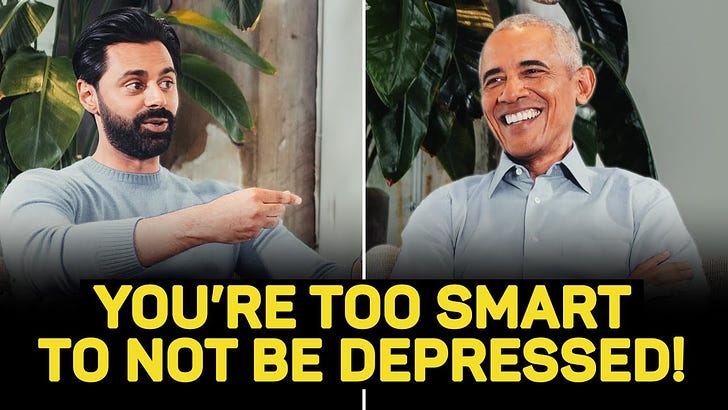


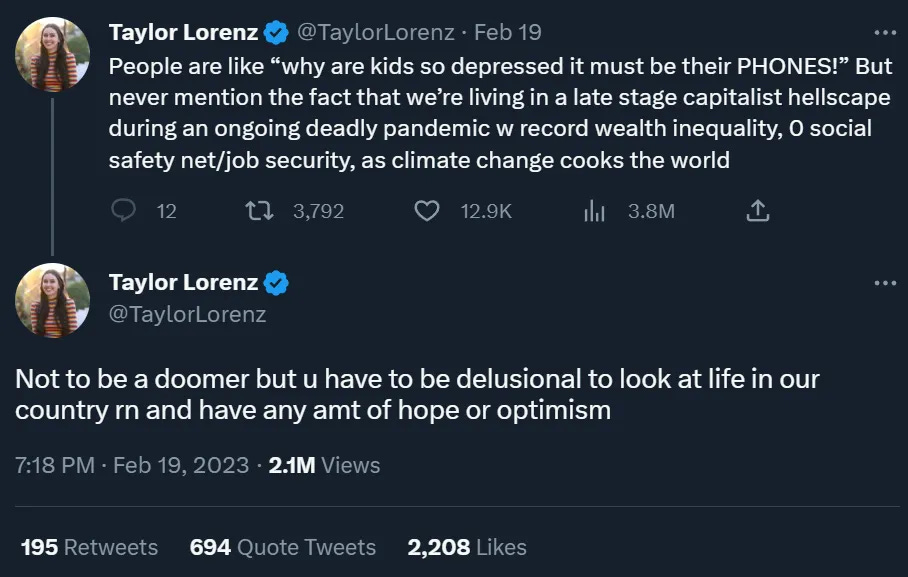

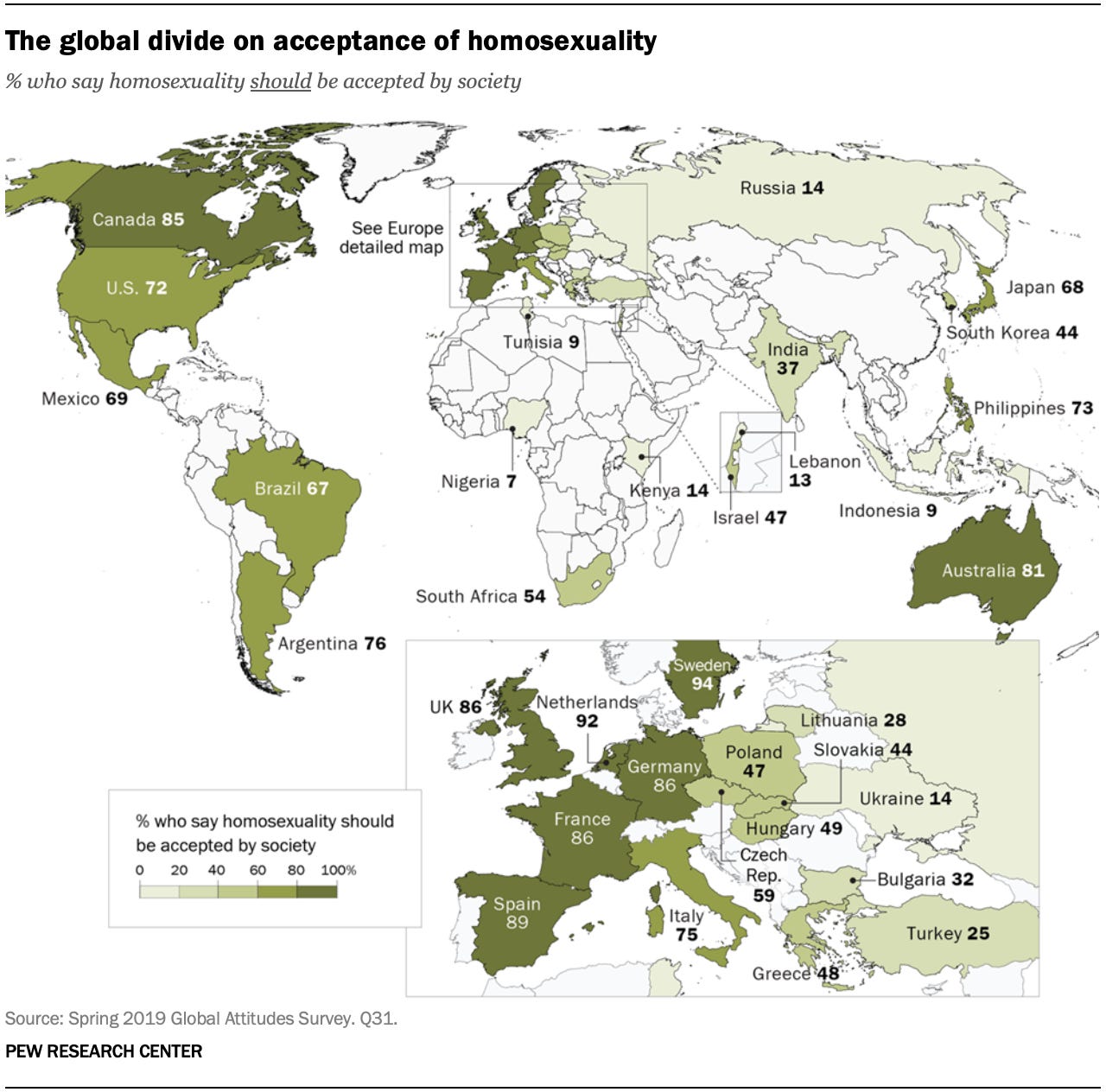
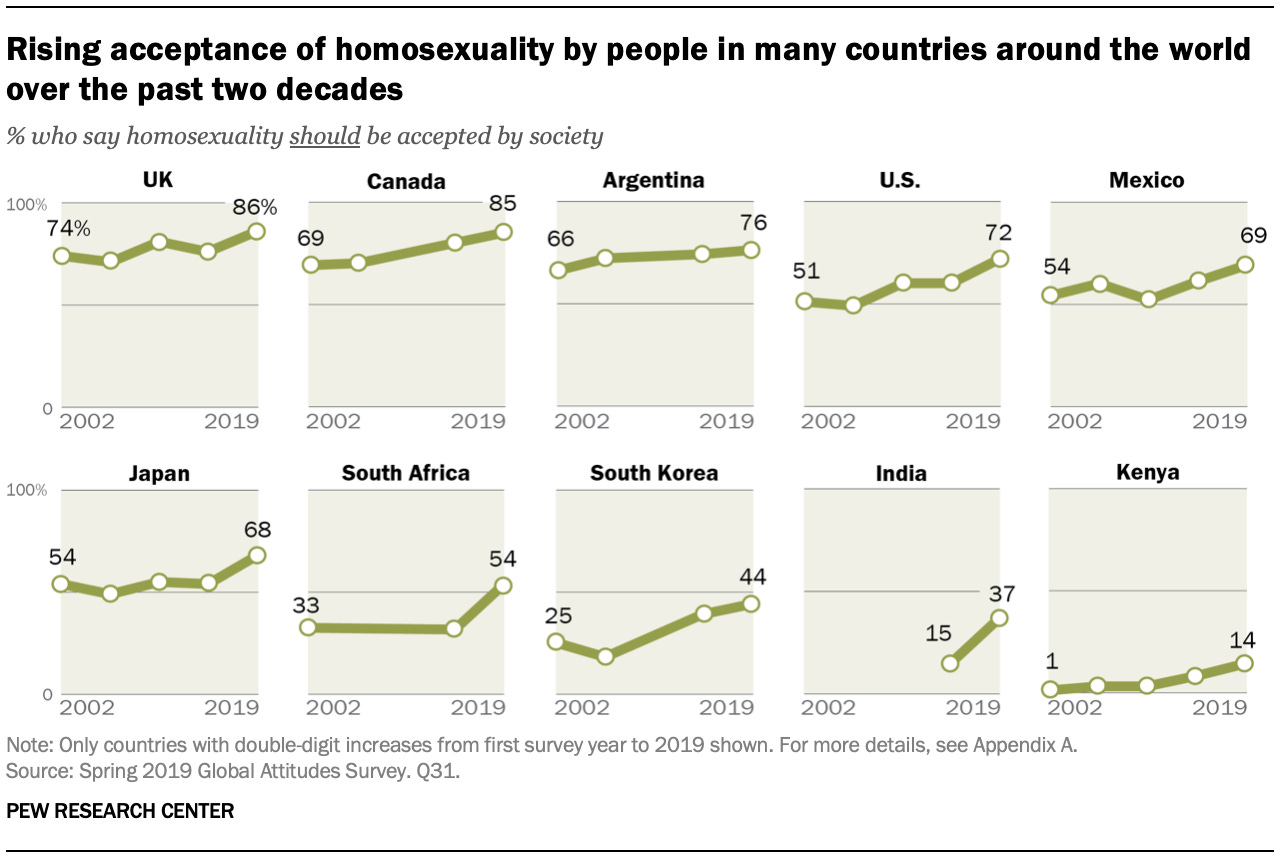

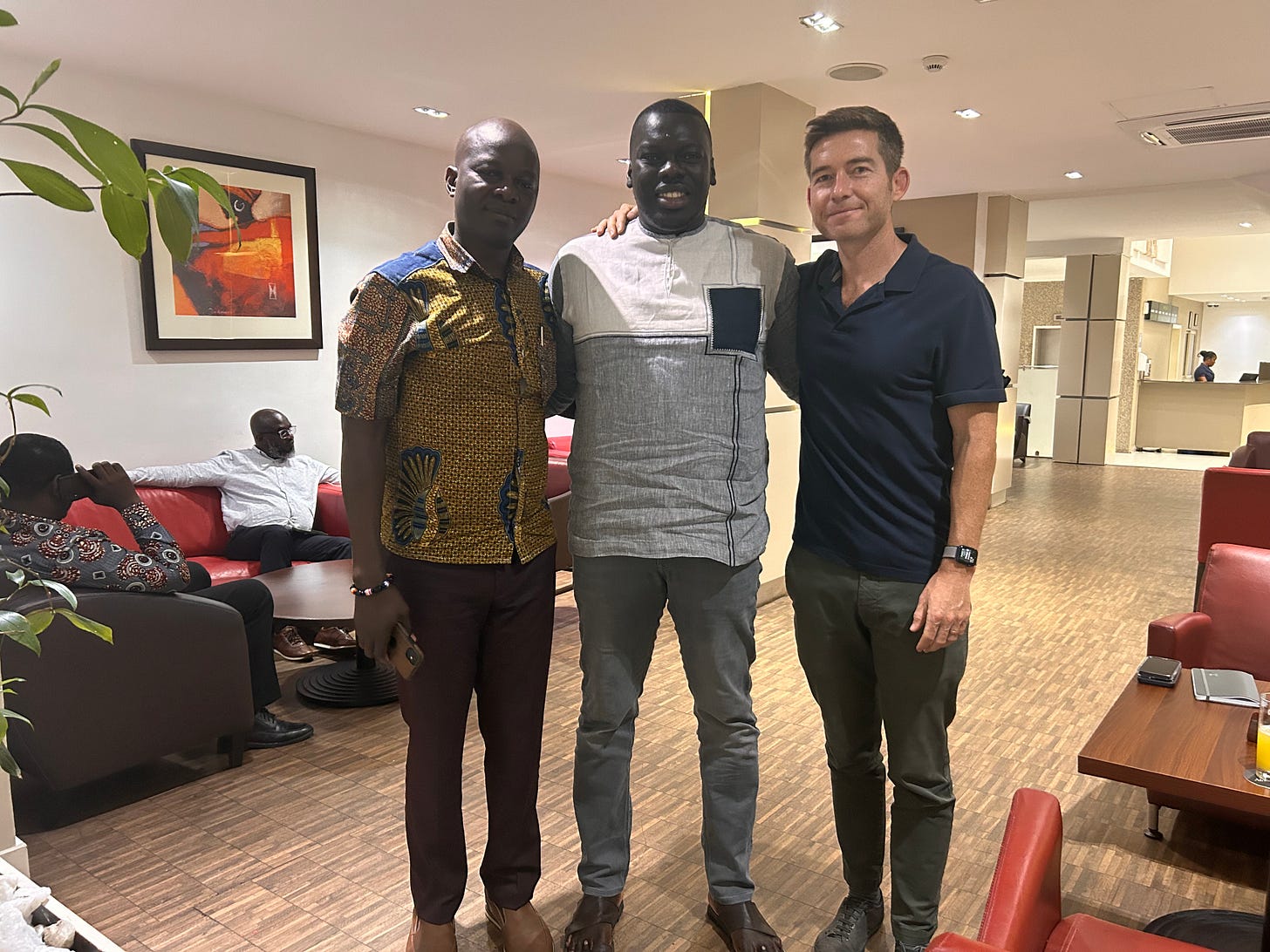
I have gay friends who lived in Uganda but eventually moved bc they felt threatened and got tired of having a second bedroom that they had to dishevel every morning to fool the maid into thinking that they slept in digger beds.